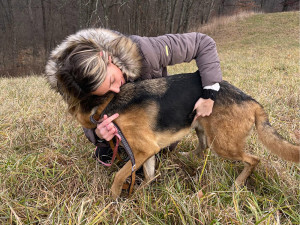Scammers Are Impersonating Animal Rescues to Target People With Missing Pets
Here are some red flags to look out for.

Share Article
Krysta Franco’s cat had been missing for eight days when she received a phone call from the Animal Rescue League of Iowa, a shelter in Des Moines, informing her that her cat had been found alive. It seemed like a hopeful ending to a nightmare situation — except for one thing: It was a scam. In reality, she had been targeted by scammers impersonating the rescue in an attempt to steal money, reported KCCI.opens in new tab
The callers told Franco that they had found her cat, but he had been hit by a car and was now in need of emergency surgery. They requested a payment of $2,400 for the urgent procedure. Franco sent all she could, a total of $500, through a payment app.
Because Franco had posted on social media asking for help finding her cat, the scammers were able to provide details about her cat, making the story feel believable to Franco in her heightened emotional state. “We were acting out of emotion versus the rationality of the situation,” Franco told KCCI. “Just to know he's missing all over again is worse than when he left.”
The growing problem of scams in the rescue world
This isn’t the first scam of its kind. In fact, the FBI has warned about lost pet scams,opens in new tab explaining that “scammers know that pet owners become distraught when their loved four-legged family member is missing” and try a variety of methods to swindle money from pet parents in distress.

Some of those scammers, like the ones who contacted Franco, claim to be rescue employees who need money to treat a pet’s injuries. Others join missing pet pages and post about finding hurt animals. “They allege that they have taken them to the veterinarian and are looking to find the owner, only to swindle money out of them, leaving the pet owner heartbroken and with less money,” the FBI explained.
In some cases, scammers even create fake profiles claiming they are able to retrieve missing pets as a service for a fee. The Missing Animal Response Network has exposed many of these invented companies.opens in new tab
How to avoid rescue scams
Franco isn’t the only one to be contacted by scammers impersonating the ARL, and the rescue has posted on Facebookopens in new tab to warn others and provide some safety tips. They recommend that if you are contacted by an animal rescue, “Verify that the person is truly a representative of the organization. Look up the organization’s contact info independently and call it directly to verify that what the caller is claiming is true.”
They add that “reputable shelters will never ask for any payment up front without giving you the opportunity to visit their facility and see your pet” ��— so if anyone is asking for money over the phone, your guard should be up.
The FBI adds that if someone claims to have your pet, you should ask them to include information or photos that aren’t publicly available. They list some red flags to look out for:
Someone being unable to provide photos.
Someone sending back an edited version of the same image you have posted on social media.
Someone making threats.
Someone asking for money or security codes.
If you think you are being contacted by scammers, reach out to the rescue they are impersonating so they are able to warn others. You can report any fraudulent website to PetScams.com.opens in new tab You can also report a fake company to the Federal Trade Commission.opens in new tab

Sio Hornbuckle
Sio Hornbuckle is the Assistant Editor at Kinship, where they frequently write for the site. As a writer, they specialize in pet news, animal science, and pop culture. They live in New York City with their cat, Toni Collette.
Related articles
![Ellos Son La Razon, the shelter in Ensenada we have been rescuing dogs from since 2017, is closing it’s doors in 2 months.]()
The Hard Truth: Some So-Called “Rescues” Are Hoarding Situations in Disguise
Here’s how to recognize the signs that you’ve encountered one.
![A woman with tattoos with close shaved blonde hair wearing a tan sweater hugging her merle coat dog outside of a dog shelter]()
Lost Pets: How to Get Them Back
Find out what to do when your pet goes missing with these tips from a pet recovery expert.
![Woman in a coat soothing a rescued German Shepherd dog in a field outside]()
9 Tips To Find a Lost Dog—Fast
Buddha Dog Rescue and Recovery founder Nicole Asher’s pro tips for getting your missing pup home safe.
![Golden retriever running around a local park during sunset]()
The Macro Benefits of Microchipping Your Dog
Sure, microchips can feel a little 1984. But if your pup has a chip, they’re four times more likely to make it home if they get lost.
![Cat wandering outside in the grass.]()
Why You Should Get Your Cat Microchipped—Even If They Live Indoors
And how to make sure your kitty’s is up to date if they already have one.





